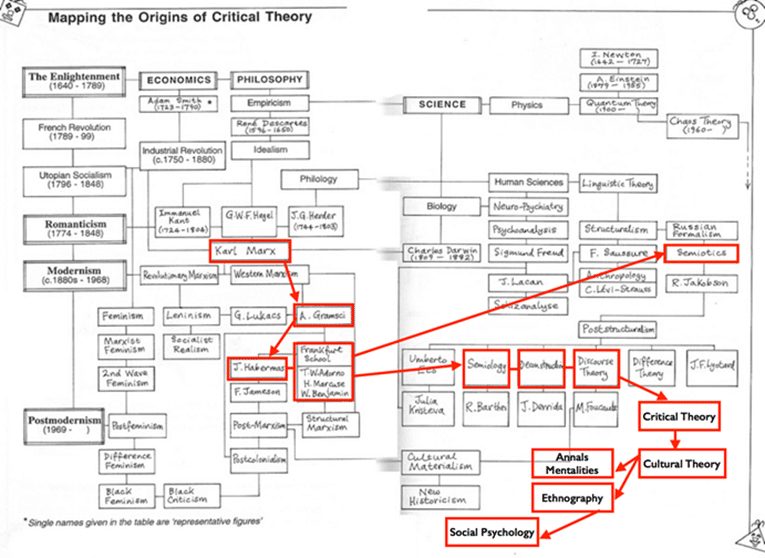Heretical, Unorthodox and Sacrilegious Safety
I was training with some people the other day and we had been going about 50 minutes when the GM sitting up the front asked ‘Isn’t this heretical stuff’? I replied ‘it would be if safety was a religion’. The next question soon came from an engineer up the back, ‘isn’t this all a bit unscientific’? I replied, ‘it would be if safety was a science’. If safety is essentially about people and not objects then the notion of religion may be more applicable than science but neither really capture what safety is about.
The beginning of being non-religious is understanding that personal and systemic beliefs/worldviews (and associated narratives) should not be held on to religiously. That is, one is less likely to hold on to things ‘sacredly’ and be prepared to be self-critical. This is one of the hallmarks of the social psychological tradition particularly as it has evolved out of cultural and critical theory. The little map below shows just how social psychology has evolved.
The connections of social psychology to critical theory makes it (more than many other traditions) acutely anti-religious, particularly as it responds to the distribution of power in cultures, ideologies and hegemony. Social psychology is neither itself a religion but rather a lens and discourse that one uses to interrogate evidence. It looks at human decision making and asks, ‘how much is human judgment influenced by social arrangements’? The things that social psychology is interested in are tabulated below:
| Decision making | Obedience |
| Relationships | Attraction |
| Communication | Pro and anti social |
| Persuasion | Community |
| Influence | Helping |
| Power | Conformity |
| Aggression | Authority |
| Politics | Salience |
| Groups | Belonging |
| Prejudice | Attachment |
So, social psychology has no sacred cows but is rather a method for interrogating human activity just as other discourses eg. science and engineering are applied to the same activity. It is a discipline just as science and mathematics are disciplines. However, from its tradition social psychology has an entirely different agenda than the maths-sciences and is much less interested in objectivist and behaviourist constructs placed on organizational and human activity. Therefore, when social psychology engages with safety (which is primarily dominates by science, engineering and regulation) it asks different questions than the dominant paradigms that fill the safety space. It is not interested in objects so much as the social space between people and about people in groups. When it takes an interest in objects as artefacts it is always interested in the ‘mentalitie’ associated with that object rather than the object itself. This is why social psychology tends to look less at hazards (objects) but is much more interested in the risks and relationships associated with a hazard. I couldn’t think of anything less meaningless than a ‘hazard hunt’, as if somehow the naming of objects can tell you about people’s decisions when they engage with that object.
Therefore, in the traditional discipline of critical theory and cultural theory, social psychology looks at the ideology of zero and sees religious devotion, the discourse of absolutes, sacred cows and immovable beliefs. It understands the absolutes of zero as a disguise for an uneven distribution of power that results in dehumanization of people.
The reason why the questions of social psychology appear to be heretical (itself a religious projection) to those in other traditions and disciplines such as engineering, science and law (that dominate safety) is that social psychology interrogates evidence from a different worldview. Critical and cultural theory methodologies are just as valid as scientific methodologies (see further the work of Kuhn http://en.wikipedia.org/wiki/Thomas_Kuhn) but moreso when applied to the domain of people, relationships and human activity.
Social psychology is far more interested in the discourse and trajectory of collective mindfulness than the assumption that a barricade will do its job. It doesn’t ask why the beautifully engineered door of the Germanwings plane did its job but rather how did a culture of denial and absolutes facilitate an incident that orthodox safety cannot seem to understand. (http://mobile.nytimes.com/2015/04/19/world/europe/germanwings-plane-crash-andreas-lubitz-lufthansa-pilot-suicide.html?emc=edit_na_20150418&nlid=67948327&_r=1&referrer=)
It postulates that a culture of absolutes like zero fosters denial and secrecy, under-reporting and shifting of focus, critical social psychological factors that science and engineering seem unable to fathom. It uses the tools of critical theory and cultural theory and interrogates the evidence asking, ‘how does the concept of 100% certainty fit what we know about human social arrangements’? It sees much more than just humans as (organizational psychology) ‘factors’ within a system and is not seduced by systemic thinking. It interrogates the evidence and through the tradition of Annals History finds a social history to the denial of risk.
The non-sacrilege of social psychology is that it asks anti-religious questions and applies them to its perception of religious ideology.



Do you have any thoughts? Please share them below